Τέχνιχ
> Mojojuju
> EDUCATION
> Plume
> Τέχνη
Τέχνη. Plume. EDUCATION. Rhapsodos. Essayer. Ways Places Means. Oratio. Os pobos. More Answers Than Questions. Eironeia. Τέχνηo. IFY-ification. 45 ways to avoid using the word 'very'. Writers Write is your one-stop resource for writers.
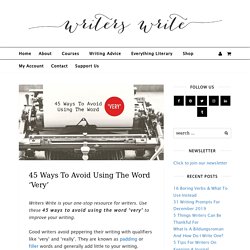
Use these 45 ways to avoid using the word ‘very’ to improve your writing. Good writers avoid peppering their writing with qualifiers like ‘very’ and ‘really’. They are known as padding or filler words and generally add little to your writing.
Five Commonly Repeated Words to Hunt Down in Your Writing. 18 Common Words That You Should Replace in Your Writing. It’s a familiar scene: you’re slumped over your keyboard or notebook, obsessing over your character.

While we tend to agonize over everything from structure to backstory, it’s important to weigh how you write something too. A perfectly constructed world is flat on the page if you use feeble, common words. When you’re finished constructing your perfectly balanced world, do your writing a favor and take another pass to weed out these 18 haggard words. Good. Synonyms for words commonly used in student's writing. Amazing- incredible, unbelievable, improbable, fabulous, wonderful, fantastic, astonishing, astounding, extraordinary.
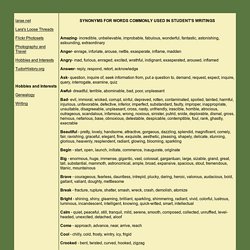
100 Exquisite Adjectives. By Mark Nichol Adjectives — descriptive words that modify nouns — often come under fire for their cluttering quality, but often it’s quality, not quantity, that is the issue.
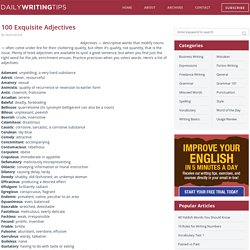
Plenty of tired adjectives are available to spoil a good sentence, but when you find just the right word for the job, enrichment ensues. Practice precision when you select words.
Enrichir son Vocabulaire pour Briller avec les Mots - Intégrer Sciences Po. Ecrire une scène. L’élaboration des scènes est l’avant-dernière étape dans le processus d’écriture du scénario, juste avant la création des dialogues.

C’est aussi la plus longue, elle demande une précision d’orfèvre. C’est le passage délicat au cours duquel on aborde la « matière » qui sera visible à l’écran. Une fois que l’on a défini les grandes lignes de son histoire, il est indispensable de travailler sur un scène à scène afin que le récit reste structuré tout au long de l’intrigue. Car, dans un récit, chaque scène doit avoir une place précise, et une utilité pour l’intrigue.
L’enchaînement des scènes ne se fait pas de manière aléatoire, en fonction de l’humeur de l’auteur et des temps morts de l’histoire. 1. Nous l’avons vu, le scénario est un texte structuré en trois actes. Chaque scène est une unité de narration qui : se déroule dans un lieu unique (unité de lieu)se déroule sur une courte période de l’intrigue en « temps réel » (unité de temps)met en scène des personnages en action 4. les dialogues. Literary Devices. Instant Grammar Check - Plagiarism Checker - Online Proofreader. Gotcha!

Grammarly texts are already correct You cannot improve on perfection. We have already proofread Grammarly website and fixed all mistakes. Please check another text or use a sample to see Grammarly in action. This text is too short. Grammarly needs more context to accurately detect mistakes. Grammarly is proofreading your text Checking for: Preposition use at the end of sentences ATTENTION: You generated too many free Grammarly reports recently. For years I have been driving an old used car with a lot of mileage and I hate it.
Tilde. Repetition (rhetorical device)
Repetition is the simple repeating of a word, within a sentence or a poetical line, with no particular placement of the words, in order to secure emphasis.
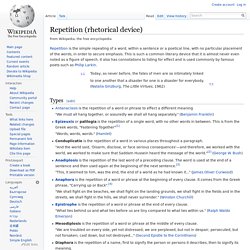
This is such a common literary device that it is almost never even noted as a figure of speech. It also has connotations to listing for effect and is used commonly by famous poets such as Philip Larkin. Antanaclasis is the repetition of a word or phrase to effect a different meaning "We must all hang together, or assuredly we shall all hang separately.
" (Benjamin Franklin)
List of forms of word play. This is a list of techniques used in word play with Wikipedia articles.
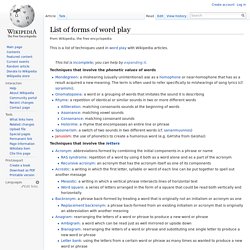
Techniques that involve the phonetic values of words Mondegreen: a mishearing (usually unintentional) ase as a homophone or near-homophone that has as a result acquired a new meaning.
Figure of speech. A figure of speech is the use of a word or a phrase, which transcends its literal interpretation.
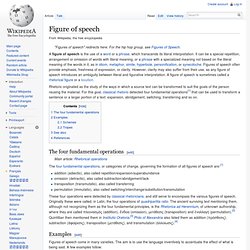
It can be a special repetition, arrangement or omission of words with literal meaning, or a phrase with a specialized meaning not based on the literal meaning of the words in it, as in idiom, metaphor, simile, hyperbole, personification, or synecdoche. Figures of speech often provide emphasis, freshness of expression, or clarity. However, clarity may also suffer from their use, as any figure of speech introduces an ambiguity between literal and figurative interpretation.
Elegant variation. It is the second-rate writers, those intent rather on expressing themselves prettily than on conveying their meaning clearly, & still more those whose notions of style are based on a few misleading rules of thumb, that are chiefly open to the allurements of elegant variation....
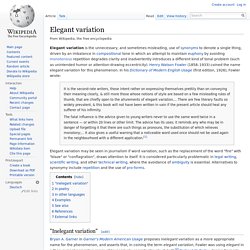
There are few literary faults so widely prevalent, & this book will not have been written in vain if the present article should heal any sufferer of his infirmity.The fatal influence is the advice given to young writers never to use the same word twice in a sentence — or within 20 lines or other limit. The advice has its uses; it reminds any who may be in danger of forgetting it that there are such things as pronouns, the substitution of which relieves monotony;...
It also gives a useful warning that a noticeable word used once should not be used again in the neighbourhood with a different application.[1] "Inelegant variation"[edit] Bryan A. In poetry[edit] In other languages[edit] Examples[edit] See also[edit]
Tone/Attitude Words.










